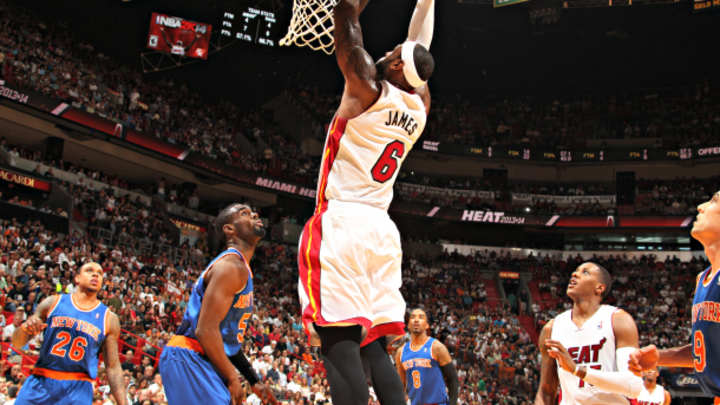Three-Pointers: LeBron James, Heat put dent in Knicks' postseason hopes

Scoring came easy for LeBron James and the Heat on Sunday. (Isaac Baldizon/NBAE via Getty Images
New York needs every win possible in its efforts to outpace the Hawks for the East's eighth seed, and that playoff candidacy took a hit with their 102-91 loss to the Miami. While the defending champs slept through the first six minutes and still made it look easy, the Knicks' season neared its inauspicious conclusion with a loss that hurt their chances at a tiebreak.
• The Heat offense set the tone: There are no simple means to limit the league's most efficient offense, but the Knicks looked capable of doing so in the first quarter. Defensive dysfunction is inevitable with this group, as New York doesn't have the scheme nor personnel to consistently apply pressure in coverage. Commitment, though, can go a long way. These Knicks are at their best on defense when they're scrapping to keep up with their marks, create turnovers, and handle mismatches no matter the underlying sloppiness of their rotations.
That combination helped New York to a double-digit lead in a matter of minutes in this one -- a best-case scenario for a team playing with its postseason hopes in the balance. By the end of the first quarter, though, the Knicks' energy and edge had faded almost completely. The initial line of defense from then on was largely outmatched or out of position. The help never came consistently enough following the initial breakdown, leaving smaller guards at the mercy of LeBron James (38 points on 22 shots, six assists and five rebounds). It was a brutal balance that saw neither James nor the Heat shooters sufficiently covered, a combination that yielded a scoring rate well above Miami's league-leading season average.
Even when the Knicks were scoring well enough to keep pace, they had to work so much harder for every sliver of advantage that the grind took its toll. Shane Battier spent the game denying Carmelo Anthony the ball and optimal scoring position, which helped hold New York's leading scorer to 13 points on 24 percent shooting from the field. Even when J.R. Smith or another Knicks shooter was able to spring free for a clean look, it was generally because the Heat had stalled the offense on the strong side of the floor by trapping hard against pick-and-rolls.
GOLLIVER/MAHONEY: Evaluating the Knicks' postseason chances
That pressure strained Anthony, in particular, who had to maneuver his way out of pressure through the length of Miami's defenders and the pain of an injured shoulder. He did well in that regard, though his inability to manufacture offense contributed to the periodic stalling of New York's offense and general malaise. That's not to say the Knicks' dry spells offensively were uniformly the fault of Anthony, though this game illustrated perfectly just how difficult even basic basketball actions can be for the Knicks when Melo isn't fully operational.
• J.R. Smith nearly devolved into self-parody by attempting an NBA-record 22 three-pointers. Without much playmaking momentum to guide New York's offense, Smith (32 points, 11-28 FG, 10-22 3FG) took it upon himself to fire away. In a sense Smith did what he was supposed to do. He countered a defense as aggressive as Miami's by shooting from the weak side -- something that Smith was all too happy to do. Yet in characteristic fashion, Smith went a bit overboard in terms of his offensive function. A few makes on open, spot-up attempts gave way to more deliberate shot hunting, which eventually paved the way for Smith to set the single-game record for three-point attempts in a game.
Raymond Felton responded to that news as I suspect many basketball fans would:
Stoudemire told Felton that JR Smith took an NBA-record 22 threes in the loss. Felton said in response, "Jesus Christ."
— Chris Herring (@Herring_NBA) April 6, 2014
To be fair, Smith's chucking wasn't altogether uncalled for. He was often the best thing that the Knicks had going offensively, as has periodically been the case in New York's past three games. Some of his attempts were hoisted a touch too quickly and others triggered when a pass would have been preferable. No team in its right mind would plan to have a player like Smith jack up 20+ three-point attempts, though with Melo jammed and the Knicks on the whole a bit stagnant there are worse ways to grasp at offensive solvency.
• Udonis Haslem is again a useful piece for the Heat. By the time the Heat wrapped up the 2013 NBA title, Haslem -- a favorite both of Erik Spoelstra and Miami fans for his defense and hustle -- was out of the playing rotation. He logged just two total minutes in Games 6 and 7 against the Spurs, left behind as an out-of-rhythm shooter in a game plan dependent on floor spacing.
That worked out for the best. But Haslem has remained on the fringes of the regular rotation this season for similar reason, all while Spoelstra has alternated between Shane Battier, Rashard Lewis, Michael Beasley and Greg Oden as periodic starters. With none among them consistently helpful enough to secure a regular starting gig, Haslem was left the slightest window for a return to prominence. In the last two weeks he's capitalized; an impressive showing against the Pacers bought Haslem a bit more playing time and a bit more leverage, with which he's taken to a starting role and made a roundly positive impact. Some matchups won't offer all that many minutes for a scrappy, undersized forward like Haslem, though over the past seven games he's managed to limit the liability in his game while helping some of the Heat's most-used lineups.

Rob Mahoney is an NBA writer dedicated to the minutiae of the game of basketball, its overarching themes and everything in between. He joined the Sports Illustrated staff in 2012.